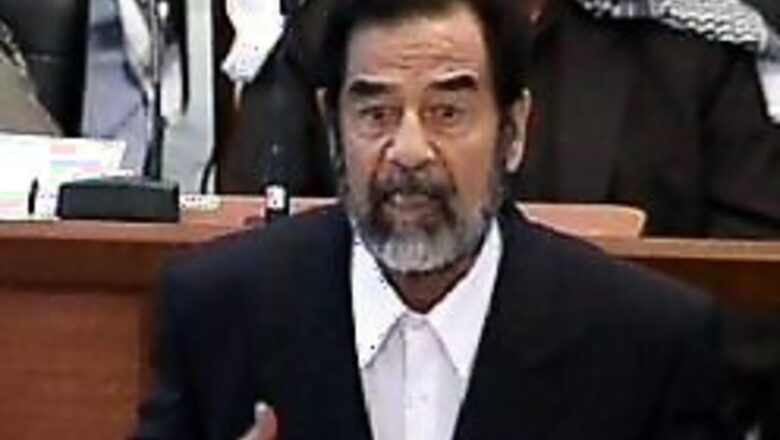
views
Baghdad: The setback-plagued trial of Saddam Hussein hit fresh controversy under its new judge on Sunday, as the former Iraqi president walked out from the court and his half-brother was ejected.
Kurdish judge Rauf Rasheed Abdel Rahman, appointed from outside the chamber, attempted immediately to stamp his authority on the trial after the controversial resignation of his predecessor Rizkar Mohammed Amin.
"I want to leave the court," Saddam told the judge, who replied that he could leave the court.
"I led you for 35 years and you order me out of the court," retorted Saddam. "I am the judge, you are the defendant. You have to obey me," said the judge. After further verbal exchanges, Saddam walked out, escorted by guards.
Amid scenes of chaos, Barzan Ibrahim Hassan al-Tikriti, half-brother of Saddam and one of the co-defendants in his trial, was physically ejected from the court by guards on order of the new judge.
"Get him out," said the judge, ordering the guards as Barzan stood up to deliver a lengthy statement about his medical condition.
The balding Rahman, dressed in a suit and his judge's robes, earlier leant back impassively in his chair as proceedings got underway and then put on spectacles to begin reading the opening statements.
The trial's first session of the new year last week had been adjourned early owing to what the court said was the absence of the necessary witnesses, in a further setback for a process already criticised for being too slow.
The January resignation of Amin, the Kurdish chief judge and public face of the trial for its past seven sessions, also raised questions about the independence of the court and its ability to handle the case.
The session was being closely watched to see whether the new judge can stamp his authority on what has until now been a tumultuous chamber, characterized by outbursts from both angry defendants and prosecutors.
A leading human rights watchdog said Amin's resignation has cast doubt on the fairness of the whole trial, which has also seen two defence lawyers murdered.
Several members of parliament and government officials had publicly criticized Amin for what they viewed as lenient treatment of Saddam and his seven co-defendants, on trial for the killing of 148 inhabitants of the Shiite village of Dujail in 1982.
"The demand for presiding judge Rizkar Amin's dismissal, which contributed to his resignation, was nothing less than an attack on judicial independence," said Richard Dicker, director of the International Justice Program at Human Rights.
Nehal Bhuta, also with Human Rights Watch, noted that Amin had shown great progress over the course of the trial and was respected for his non-partisan approach to a very politically loaded case.
"Amin was clearly even-handed and had great integrity and he was a very attractive face for justice in the new Iraq," he said.
Amin's successor was originally expected to be Said al-Hammashi, a Shiite and the next senior judge on the five-person panel. However, he was transferred off the court after the de-Baathification committee protested over his appointment due to his alleged membership in the former ruling party.
The reshuffle of the judges also means that a significant proportion of the panel will not have been present for the previous 15 witnesses' testimony.
Abdel Rahman, 64, is the vice president of the criminal court in the northern town of Arbil and helped found the human rights organization of the Kurdish autonomous region in 1991.
He was twice arrested by the Iraqi government and at one point was tortured so badly he was partly paralyzed.
















Comments
0 comment